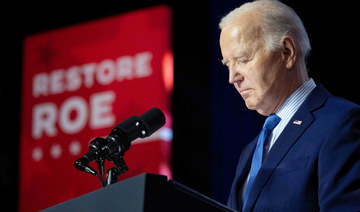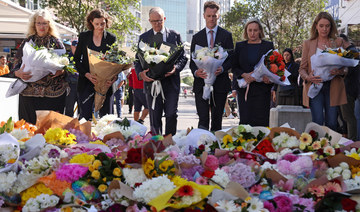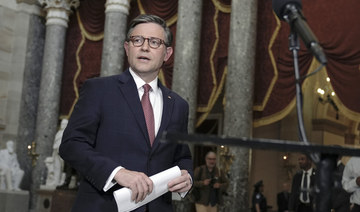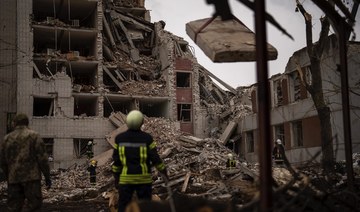COPENHAGEN: Sweden on Wednesday offered to host talks between Yemen’s warring parties as Washington called for an urgent halt to hostilities and the UN special envoy ramped up efforts to revive discussions that failed nearly two months ago.
Swedish Foreign Minister Margot Wallstrom said the United Nations has asked her country if it “could be a place for the UN envoy to gather the parties in this conflict” — the internationally recognized government, supported by a Saudi-led coalition, and Yemen’s Iran-backed Shiite rebels known as Houthis.
Wallstrom told Swedish news agency TT that her country would be “happy about it,” but that nothing is definite.
The possible venue comes as UN envoy Martin Griffiths called on the opposing sides in the 3 1/2-year conflict to heed “recent calls” for a quick resumption of the political process and efforts to win a halt to fighting in Yemen.
The Trump administration late Tuesday called for an urgent halt to the war and a start to negotiations aimed at a political settlement. Secretary of State Mike Pompeo asked all parties to support Griffiths in what Pompeo said must be “substantive consultations” in November in a third country.
In separate remarks, also Tuesday, Defense Secretary Jim Mattis called for a cease-fire within 30 days.
Nigel Tricks of the Norwegian Refugee Council welcomed the cease-fire call, saying it could be “the political breakthrough that we have long requested from parties to this brutal war” that has been “four years of hell for Yemeni women, men and children.”
Griffiths urged the concerned parties to “seize this opportunity” and singled out support for “confidence-building measures” such as Yemen’s central bank, a prisoner exchange and the re-opening of the airport in the rebel-held Yemeni capital, Sanaa.
“Dialogue remains the only path to reach an inclusive agreement,” Griffiths said in a statement.
Wallstrom reiterated Sweden’s support for Griffiths, whose efforts to host talks between the government and rebels in Geneva in September ran aground when Houthi representatives didn’t show up, insisting they had not been guaranteed safe return after the discussions.
The conflict in Yemen, the Arab world’s poorest country, began with the 2014 takeover of Sanaa by the Houthis who toppled the internationally recognized government. A Saudi-led coalition allied with the government has been fighting the Houthis since 2015.
The war has killed over 10,000 people and pushed Yemen to the brink of famine. The UN says Yemen is facing the world’s worst humanitarian crisis.
At the beginning of 2017, the UN and its partners provided aid to 3 million hungry Yemenis. Since then, assistance has been scaled up, reaching 8 million people last month because of generous funding from donors, but far below the 14 million people — or half Yemen’s population — who may need it.
Earlier this month, Mark Lowcock, the UN humanitarian chief, warned of “an imminent and great big famine engulfing Yemen.”
Sweden says it could host Yemen’s warring sides for talks
Sweden says it could host Yemen’s warring sides for talks

- Wallstrom said the United Nations has asked her country if it “could be a place for the UN envoy to gather the parties in this conflict”
- She told Swedish news agency TT that her country would be “happy about it,” but that nothing is definite
US congressional committee releases sealed Brazil court orders to Musk’s X, shedding light on account suspensions
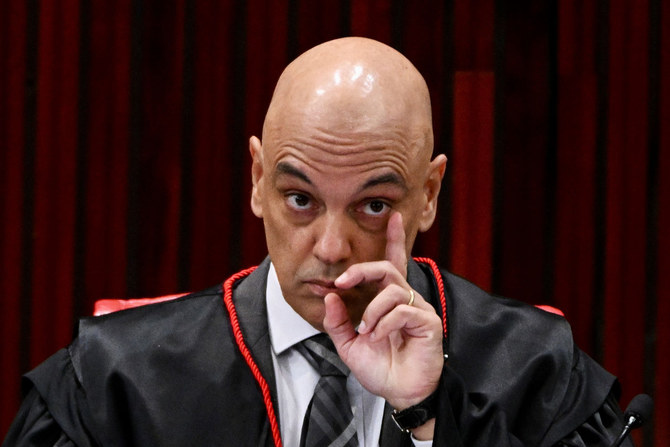
RIO DE JANEIRO: A US congressional committee released confidential Brazilian court orders to suspend accounts on the social media platform X, offering a glimpse into decisions that have spurred complaints of alleged censorship from the company and its billionaire owner Elon Musk.
The Republican-controlled House Judiciary Committee late Wednesday published a staff report disclosing dozens of decisions by Brazilian Supreme Court Justice Alexandre de Moraes ordering X to suspend or remove around 150 user profiles from its platform in recent years.
The 541-page report is the product of committee subpoenas directed at X. In his orders, de Moraes had prohibited X from making them public.
“To comply with its obligations under US law, X Corp. has responded to the Committee,” the company said in a statement on X on April 15.
The disclosure comes amid a battle Musk has waged against de Moraes.
Musk, a self-proclaimed free-speech absolutist, had vowed to publish de Moraes’ orders, which he equated to censorship. His crusade has been cheered on by supporters of far-right former President Jair Bolsonaro, who allege they are being targeted by political persecution, and have found common cause with their ideological allies in the US
De Moraes has overseen a five-year probe of so-called “digital militias,” who allegedly spread defamatory fake news and threats to Supreme Court justices. The investigation expanded to include those inciting demonstrations across the country, seeking to overturn Bolsonaro’s 2022 election loss. Those protests culminated in the Jan. 8 uprising in Brazil’s capital, with Bolsonaro supporters storming government buildings, including the Supreme Court, in an attempt to oust President Luiz Inácio Lula da Silva from office.
De Moraes’ critics claim he has abused his powers and shouldn’t be allowed to unilaterally ban social media accounts, including those of democratically elected legislators. But most legal experts see his brash tactics as legally sound and furthermore justified by extraordinary circumstances of democracy imperiled. They note his decisions have been either upheld by his fellow justices or gone unchallenged.
The secret orders disclosed by the congressional committee had been issued both by Brazil’s Supreme Court and its top electoral court, over which de Moraes currently presides.
The press office of the Supreme Court declined to comment on the potential ramifications of their release when contacted by The Associated Press.
“Musk is indeed a very innovative businessman; he innovated with electric cars, he innovated with rockets and now he invented a new form of non-compliance of a court order, through an intermediary,” said Carlos Affonso, director of the nonprofit Institute of Technology and Society. “He said he would reveal the documents and he found someone to do this for him.”
Affonso, also a professor of civil rights at the State University of Rio de Janeiro, said that the orders are legal but do merit debate, given users were not informed why their accounts were suspended and whether the action was taken by the platform or at the behest of a court. The orders to X included in the report rarely provide justification, either.
The Supreme Court’s press office said in a statement Thursday afternoon that the orders do not contain justifications, but said the company and people with suspended accounts can gain access by requesting the decisions from the court.
While Musk has repeatedly decried de Moraes’ orders as suppressing “free speech” principles and amounting to “aggressive censorship,” the company under his ownership has bowed to government requests from around the world.
Last year, for instance, X blocked posts critical of Turkish President Recep Tayyip Erdogan and, in February, it blocked accounts and posts in India at the behest of the country’s government.
“The Indian government has issued executive orders requiring X to act on specific accounts and posts, subject to potential penalties including significant fines and imprisonment,” X’s global affairs account posted on Feb. 21. “In compliance with the orders, we will withhold these accounts and posts in India alone; however, we disagree with these actions and maintain that freedom of expression should extend to these posts.”
Brazil is a key market for X and other social media platforms. About 40 million Brazilians, or about 18 percent of the population, access X at least once per month, according to market research group eMarketer.
X has followed suspension orders under threat of hefty fines. De Moraes typically required compliance within two hours, and established a daily fine of 100,000-reais ($20,000) for noncompliance.
It isn’t clear whether the 150 suspended accounts represent the entirety of those de Moraes ordered suspended. Until the committee report, it wasn’t known whether the total was a handful, a few dozen or more. Some of the suspended accounts in the report have since been reactivated.
On April 6, Musk took to X to challenge de Moraes, questioning why he was “demanding so much censorship in Brazil”. The following day, the tech mogul said he would cease to comply with court orders to block accounts — and that de Moraes should either resign or be impeached. Predicting that X could be shut down in Brazil, he instructed Brazilians to use a VPN to retain their access.
De Moraes swiftly included Musk in the ongoing investigation of digital militias, and launched a separate investigation into whether Musk engaged in obstruction, criminal organization and incitement. On April 13, X’s legal representative in Brazil wrote to de Moraes that it will comply with all court orders, according to the letter, seen by the AP.
Affonso said the committee’s release of de Moraes’ orders were aimed less at Brazil than at the administration of US President Joe Biden. The report cites Brazil “as a stark warning to Americans about the threats posed by government censorship here at home.”
Terms like “censorship” and “free speech” have turned into political rallying cries for US conservatives since at least the 2016 presidential election, frustrated at seeing right-leaning commentators and high-profile Republican officials booted off Facebook and Twitter in its pre-Musk version for violating rules.
“The reason why the far-right needs him (Musk) is because they need a platform, they need a place to promote themselves. And Elon Musk needs far-right politicians because they will keep his platform protected from regulations,” said David Nemer, a Brazil native and University of Virginia professor who studies social media.
In the US, free speech is a constitutional right that’s much more permissive than in other countries, including Brazil. Still, the report’s release seemed to invigorate Bolsonaro and his far-right supporters.
Late Wednesday, soon after the court orders were released, Bolsonaro capped off a speech at a public event by calling for a round of applause for Musk.
His audience eagerly complied.
Over 100 pro-Palestinian protesters arrested from New York’s Columbia campus
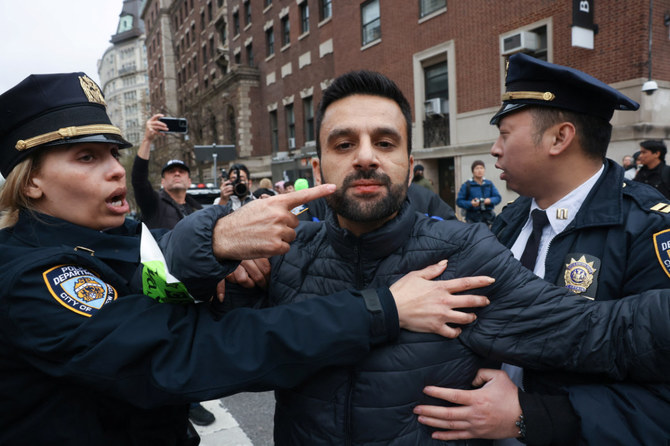
- University President Nemat Minouche Shafik said she authorized police to remove tents set up by protesters for the safety of the campus
- Protesters clashed with police, bringing back memories of the demonstrations against the Vietnam War at Columbia more than 50 years ago
More than 100 pro-Palestinian protesters were arrested on Wednesday on the campus of Columbia University after its president authorized New York police to clear an encampment set up by students demonstrating against Israel’s actions in Gaza.
Columbia University President Nemat Minouche Shafik, who a day earlier came under fire from Republicans at a House of Representatives committee hearing on antisemitism on campus, said she had authorized police to clear an encampment of dozens of tents set up by protesters on Wednesday morning.
“Out of an abundance of concern for the safety of Columbia’s campus, I authorized the New York Police Department to begin clearing the encampment ... ” Shafik said in a statement.
Shafik said the protesters had violated the school’s rules and policies against holding unauthorized demonstrations, and were not willing to engage with administrators.
New York City Mayor Eric Adams said police made over 108 arrests, adding “there was no violence or injuries during the disturbance.” Adams added students had the right to free speech but not the right to violate university policies. Police officials said the arrests were related to trespassing.
Columbia said it had started to suspend students who had participated in the tent encampment, which the school considers an unauthorized protest.
“We are continuing to identify them and will be sending out formal notifications,” a spokesperson of the university said in an email.
At least three students have already received suspension notices from Barnard College, an affiliate of Columbia, for participating in the encampment, Institute for Middle East Understanding, a pro-Palestinian advocacy group, said.
The three students were Isra Hirsi, Maryam Iqbal, and Soph Dinu, the institute said. Hirsi is the daughter of US Representative Ilhan Omar, who had expressed support for protesters during the hearing at which Shafik testified on Wednesday.
“Those of us in Gaza solidarity encampment will not be intimidated,” Hirsi said on social media after being suspended.
The clash, reminiscent of the demonstrations against the Vietnam War at Columbia more than 50 years ago, is the latest in a series of demonstrations on US university campuses since the latest escalation of the Israeli-Palestinian conflict began on Oct. 7. Anti-war protests have been staged near airports and on bridges in New York, Los Angeles and other cities, while vigils and marches have taken place in Washington and elsewhere.
Alongside the proliferations of protests, human rights advocates have also pointed to a rise in bias and hate against Jews, Arabs and Muslims in recent months.
The congressional committee on Wednesday accused Shafik of failing to protect Jewish students on campus, echoing accusations leveled against three other elite university leaders at a hearing last year that sent shockwaves through higher education.
She responded by saying the university was facing a “moral crisis” with antisemitism on campus, and Columbia had taken strong actions against suspected perpetrators.
Protesters at Columbia have demanded a permanent ceasefire in the Gaza enclave and an end to US military assistance for Israel, as well as divestment by the university from companies that profit from Israel’s incursion into Gaza.
The encampment was organized by a student-led coalition of groups, including Columbia University Apartheid Divest, Students for Justice in Palestine, and Jewish Voice for Peace.
Separately on Thursday, a march was also planned at the University of Southern California in support of Asna Tabassum, a Muslim student whose valedictorian speech was canceled by the university, which cited safety concerns.
Tabassum and her supporters say the university sought to silence her because of her opposition to the Israeli assault on Gaza, which has killed over 33,000 people, according to the Gazan health ministry, and displaced nearly all its 2.3 million population.
Israel’s assault was triggered by the Oct. 7 cross-border attack by Hamas militants that killed 1,200 people, according to Israeli tallies.
Teenager charged with terrorism over stabbing attack on TikToker Sydney bishop
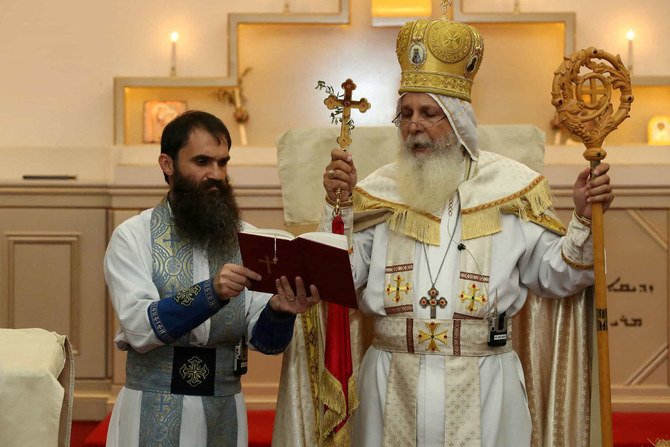
- Police said the boy had traveled for 90 minutes to reach the church from his home and stabbed Bishop Mar Mari Emmanuel at least six times
- The 53-year-old Assyrian Church bishop has a popular youth following on TikTok and has been a target of criticism, hate and online trolling
SYDNEY, Australia: A 16-year-old boy has been charged with a terrorism offense for allegedly stabbing an Assyrian church bishop in Sydney during a church service, Australian police said on Friday, as investigations continued into a riot after the knife attack.
Police from the joint counter-terrorism team questioned the boy, who is in a hospital under police guard recovering from injuries, on Thursday and charged him with committing a terrorist act. If convicted, he could get a maximum penalty of imprisonment for life.
He has been refused bail and is expected to appear before a bedside court hearing on Friday, New South Wales state Police Commissioner Karen Webb said during a press conference.
Police will allege the bishop was stabbed as many as six times and that the boy had traveled for 90 minutes to reach the church from his home, Webb said.
A riot broke out outside the church soon after the attack on Bishop Mar Mari Emmanuel after an angry crowd demanded the suspected attacker be handed over to them. More than 50 police officers were injured and 20 police cars were damaged.
The 53-year-old bishop has a popular youth following on TikTok and has been a target of criticism, hate and online trolling. His sermons range from homilies on the Bible to fiery criticisms of homosexuality, COVID-19 vaccinations, Islam and the election of US President Joe Biden.
Bishop Emmanuel, in an audio message on social media on Thursday, said he had forgiven his attacker and that he was recovering quickly.
Two knife attacks within three days — at a mall near Bondi beach that killed six people on Saturday and at the Assyrian Christ The Good Shepherd Church in Sydney’s west on Monday — have shocked residents of Australia’s most populous city.
The incidents have sparked calls for greater public security in Australia, where gun crimes and knife attacks are rare due to tough laws.
The shopping center will reopen for business on Friday, while a candlelight vigil will be held on Sunday to mourn the victims. The attacker, 40-year-old Joel Cauchi, was shot to death by police inside the mall.
Ukraine seeks urgent G7, NATO help for battered air defenses

- NATO chief says working on a solution
- UK seeks ‘creative’ deal on seized Russian assets
CAPRI, Italy: Ukraine warned foreign ministers from the Group of Seven (G7) major powers on Thursday they had to change strategy if they wanted Kyiv to withstand increasingly destructive Russian air assaults.
The G7 ministers meeting on the island of Capri acknowledged the need to get more air defense systems to Ukraine and applauded Ukrainian Foreign Minister Dmytro Kuleba as he joined them on the second day of their three-day gathering.
The G7, comprising Italy, Canada, France, Germany, Japan, Britain, the United States and European Union representatives, has been fiercely critical of Russia’s two-year long invasion of Ukraine.
However, military aid to Kyiv has slowed in recent months, with European partners apparently running low on ammunition and vital US funding blocked by Republicans in Congress.
Speaking to reporters as he arrived in Capri, Kuleba bemoaned the fact that while US, British and French forces had intervened on Saturday to help prevent Iranian missiles from hitting Israel, his own country lacked vital defenses.
“The strategy of our partners in Israel seems to be in preventing damage and death. ... In the last months, the strategy of our partners in Ukraine seems to be in helping (us) to recover from damage,” he said.
“So our job today is to find a way where our partners will design a mechanism, a way that will allow us also to avoid death and destruction in Ukraine.”
NATO Secretary General Jens Stoltenberg also took part in Thursday’s G7 meetings, telling reporters beforehand that the military alliance was actively seeking to send more air defense systems as quickly as possible.
“We are working at the possibility of (dispatching) more Patriot batteries to Ukraine. We are in dialogue with some specific countries,” he said.
In Washington, Ukrainian Prime Minister Denys Shmyhal told reporters that Ukraine had asked for additional air defense equipment and another Patriot missile battery, adding that Kyiv was looking for a minimum of seven Patriot systems.
Shmyhal declined to say how many Patriot systems Ukraine had currently, saying that was classified information.
He said US and White House officials had assured the Ukrainian delegation that weapons would be supplied in a matter of weeks, not months, once a $60.8 billion US aid package for Ukraine was approved by Congress.
“We hope it will take days, but not more than weeks,” he said.
Domestic political wrangling has delayed delivery of the US aid, but the US House of Representatives might finally get to vote on the package this weekend, bringing some hope to G7 ministers.
Looking to Washington
Germany has already said it would hand over one Patriot system. European Union foreign policy chief Josep Borrell urged other EU nations to do likewise to help stave off concerted Russian attacks on vital Ukrainian infrastructure.
“Otherwise the electricity system of Ukraine will be destroyed. And no country can fight without having electricity at home, in the factories, online, for everything,” he told reporters in Capri.
“In these turbulent times, it is a hopeful sign that there are now signals from the Republicans in the US that support for Ukraine can be continued intensively,” German Foreign Minister Annalena Baerbock told a news conference.
Another key issue under review is how to use profits from some $300 billion of sovereign Russian assets held in the West to help Ukraine, as European Union member states hesitate over concerns about the legality of such a move.
“It’s important we try and get agreement. ... That’s what we’re discussing here. I’m in no doubt we will find a way, but we’re going to have to be creative. We’ll have to be flexible,” said British Foreign Secretary David Cameron.
Shmyhal told reporters in Washington that he had detailed discussions with US and G7 officials about how to use the frozen Russian assets, and he expected some results on that front this year.
Kuleba said he hoped to get immediate pledges this week on the delivery of more Patriot and SAMP/T air defense systems and also new Western sanctions targeting Iran’s production of armed drones, which are being exported to Russia.
Hours later, the United States and Britain announced they would introduce new sanctions on Iran targeting its drone program in retaliation for the April 13 strike on Israel.
But some G7 ministers also urged Israel not to exacerbate an already tense situation with a major retaliation of its own.
“Our appeal is always for prudence and de-escalation,” said Italian Foreign Minister Antonio Tajani. “We hope that Israel’s response, which will probably come, will be a targeted response and not something that provokes escalation.”
REVIEW: Netflix’s ‘Crashing Eid’

Shying away from the traditional, comedy television show “Crashing Eid” presents quite a progressive viewpoint — but certainly not an uncommon one.
The four-episode series follows the story of Razan, an independent young Saudi woman who fled her old life and built a new one in London along with her teenage daughter Lamar — only to find herself in love with a Pakistani Brit, Sameer.
The show opens with a surprise spin as Razan takes it upon herself to initiate a proposal to Sameer, who she has known for two years. She and her daughter then plan to take a short trip back to hometown Jeddah during Ramadan, without her family knowing that she has no plans to move back home — or that she is engaged.
Sameer decides to return the surprise by showing up to her family’s home, only to be met by Razan’s father, who mistakes him for a maintenance worker. This spurs the show into a flurry of misunderstandings and awkward interactions that surface some rather crucial unresolved family issues and traumas.
As Saudi has become more global in its population, in many ways including international marriages, the issues in “Crashing Eid” have become more vital to discuss than ever.
Rather than focusing on the difficulties that come with marrying a foreigner, such as lengthy legal procedures and official marriage approvals, the show hones in on societal acceptance. The aspects of honor and locality of marriage are brought to the surface.
The show also uses the main plot to dig up some underlying issues prevalent in any society, not just in Saudi Arabia. Through Razan’s homecoming, she is forced to revisit the reality of her previous marriage to Lamar’s father, who had been physically abusive. Choosing to leave him and start a new life abroad, she is met with societal condemnation and victim blaming.
While Razan’s brother Sofyan battles divorce and child custody issues, the family reveals the challenges of generational gaps. It also demonstrates the common shift to the globalization of younger generations and the tight hold on traditions within older ones.
The show has a unique way of making difficult or rather taboo topics palatable for a general Saudi audience. It sets the table for conversation, at the very least.
Sure, some of the acting seemed fairly novel, reminiscent of early 2000s sitcoms sans the laugh track, and the show also had a peculiar style of direction and editing.
But certainly, “Crashing Eid” must be applauded for its bold statements, proving that it is not afraid to rock the boat for the chance to tell authentic Saudi stories. For anyone looking to get a deeper sense into the modern-day Saudi household, the show is a must-watch.





